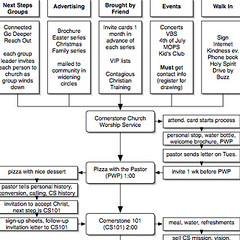Getting Things Done - Returned Calls!
 My mom quit leaving me voicemail. It happened about a year ago. Come to think of it, I guess everyone else quit leaving me voicemail too. I guess they all just finally gave up hope of me ever calling them back.
My mom quit leaving me voicemail. It happened about a year ago. Come to think of it, I guess everyone else quit leaving me voicemail too. I guess they all just finally gave up hope of me ever calling them back.One of the unintended and unforeseen benefits of GTD recently came to my attention when I was doing last week's GTD Mastery Review. #59 says, "I always return phone calls within 24 hours, usually within 2-12 hours, with none lost or forgotten." And to my own great surprise, I checked it off.
One of the greatest sources of my pastoral stress (and even mild paranoia) was the fact that people wanted to get in touch with me. So they would leave me a message. I would listen to it and intend to call them back. No, really! I intended to call back.
I might even save the voice message, if I thought it was really, really, really important (or if it was too detaily for me to remember).
And then the messages would sit in my brain until I forgot them or in my "saved messages" until my phone would alert me that they were about to be erased. In a moment of panic, I would listen to them all, hoping I hadn't forgotten something important.
(And I would feel rather smug. All of the things had been taken care of. Without me ever having to return one phone call.)
Well, when I started GTD, all of that changed. I only checked my messages when and where I could write them down. No more checking voicemail in my car or whenever it came in no matter where I was.
That's all. No big trick. Once I started capturing the voicemails into my GTD system, I automatically started calling people back.
So, if you're one of those people who quit leaving me messages... try it again. I've found my brain and know what to do with it now.
-----------------------
Small Print: this offer not available if you call my home phone or if I really don't want to talk to you.
Labels: GTD, Time Management, Tips n Tricks



